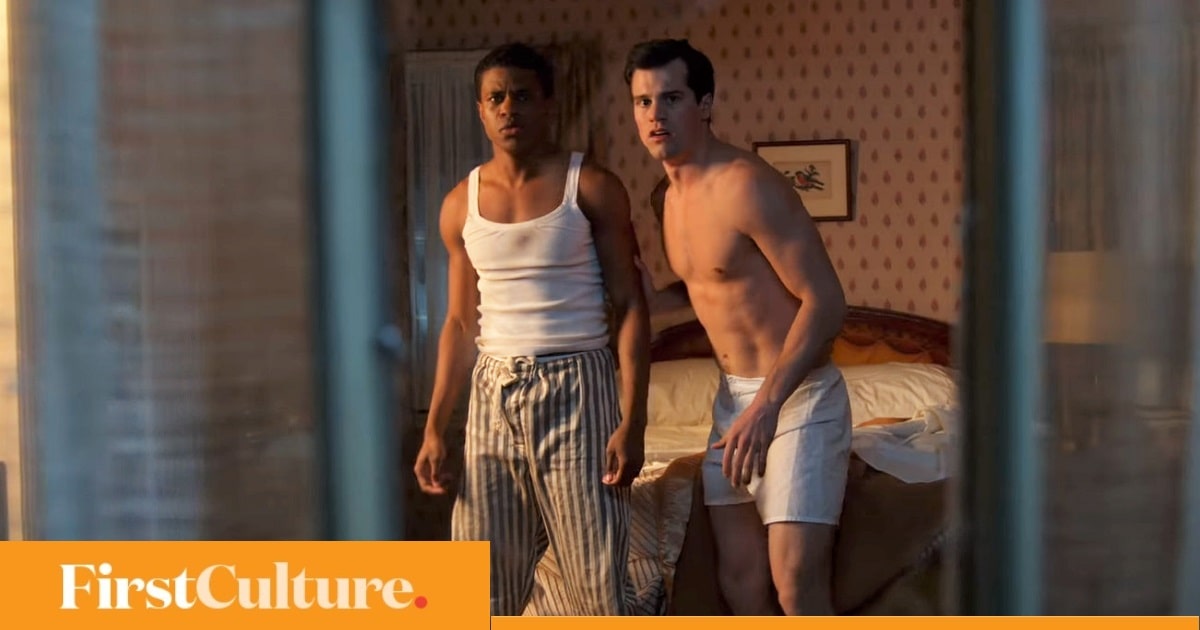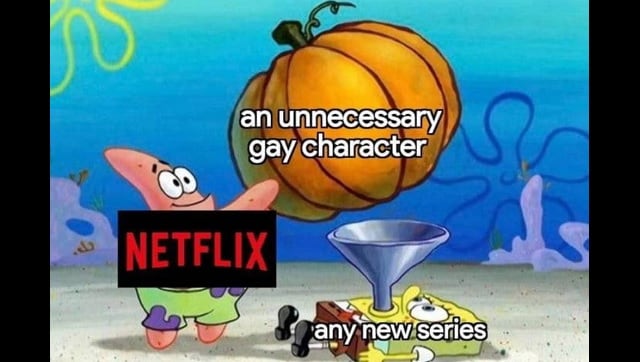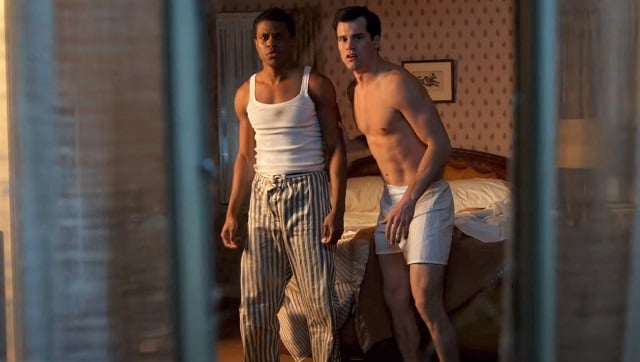
Schitt's Creek to Made in Heaven, why wave of LGBTQ+ content has met with complicated reception from queer folk- Entertainment News, Firstpost
a Twitter user put out a meme, it had Patrick from SpongeBob SquarePants as Netflix, force-feeding a humongous pumpkin through a funnel, which was labelled “unnecessary gay character” to Spongebob who was a stand-in for “any new series”. Then, Netflix got everyone swooning when they clapped back on Twitter with the line: "sorry you have yet to realise that every gay person is very necessary." Netflix’s catalogue of LGBTQ+ shows has grown so much in the past year that they have even relaunched their vertical The Most to engage with the queer community across all social media platforms. This year, Will & Grace, touted as the first American network sitcom with openly gay characters and even the first gay kiss called curtains. And so did Schitt’s Creek – a Canadian show helmed by the father-son duo of Eugene and Daniel Levy – after giving us a big gay wedding and the gift of Catherine O’Hara saying ‘bebe’. While, one might have expected pure joy with regards to access to this kind of visual material, in speaking to queer people from across generations, it seems there is a complicated reception to this new tsunami of LGBTQ+ content. It definitely isn’t as simple, or straightforward as declaring it an entirely positive trend.

The meme which went viral on Twitter in May. Image via Twitter/@AdamSB___
In the contemporary, we have a habit of declaring everything as new though 78-year-old Patrick Wilson, a former social worker and self-taught designer, was quick to point out that isn’t the case at all and told us about his days in London before moving back to India in the 1990s. “In the mid-60s, there was a popular British radio show called Round the Horne, which always had a skit by two characters Julian and Sandy played by Hugh Paddick and Kenneth Williams, who were ‘supposedly straight’ playing ‘gay characters’ but anecdotal evidence within the community said otherwise,” he whispers. “And also they spoke in double entendres referencing the gay subculture picking up nuance in an empathetic way but also used words and phrases from Polari, a slang language spoken mostly by the gay men, which was a sure-fire giveaway,” he tells us. “I remember my friends and I waiting for this segment in the programme before we hit the bars on Sunday and discussed the skit word for word, compared the different skits and so on,” he recalls. “It is true that it was mostly limp-wristed men and short-haired women who were the punchlines. And yes, gay was always dressed up as comedy in those days, which wasn’t always very nice towards us. Comedy did allow for a lot of general conversation to take place,” Patrick says, comparing it to the either explicit or tragic gay figure in today’s content.
For Ryan Frantz, a 40-year-old creative consultant and writer, these new shows might be exciting and entertaining personally but he does find that it isn’t an experience he is able to share with his immediate family at all times. “I’ve recently introduced my mother to shows like The Golden Girls and Hot in Cleveland because as popular shows that deal with a cross-section of topics in a complex, complicated manner, they’re able to bridge that missing narrative because the gay figure as just nudity and sex scenes which doesn’t always cut it,” he says. Though as someone attempting to write a novel on Anglo-Indians growing up in a Railways Town in the 1960-70s, Ryan understands where the discomfort with telling hazardous kinds of stories can come from. “I haven’t had any access to first-hand accounts of being openly gay from those times, and so if I’m going to invent a relate largely from my imagination, I keep trying to avoid the pitfalls of pinning it on a butch, short-haired aunty or a bachelor uncle who is good at jiving but I can see how that can be the easy way to do it,” he says, letting us in on his own process. But Ryan does see the way these digital platforms allow for mainstream access, which is also great and maybe it will take time for stereotypes to be dispelled with. “Though even before watching my first queer-themed show I understanding Chandler from Friends was gay and still think so,” he admits and laughs.

A still from Ryan Murphy's Netflix mini-series, Hollywood. YouTube screengrab.
Ryan was alluding to this quite special queer ability to read queerness even into heterosexual characters, something that Mujeer Pasha, a 30-year-old filmmaker admitted as something he did for the longest time with Hindi films. “I feel like I have always noticed these characters that were typically called ‘naram garam’ in these films, they were like caricatures but I saw them even before I had the words to describe myself,” he tells us. As a filmmaker, Mujeer understands the pressures of making a film with gay characters. “Such a film carries a lot on its shoulders, one wants to cut across audiences and make it mainstream but one should also understand the things lost in making it acceptable to everyone,” he explains. He admits that he has only recently started seeking out LGBTQ+ content but finds that the times it clicks for him are “when the inclusion of the character isn’t striking or a checklist which it felt like in the case of Netflix’s 2019 version of Tales of the City”. He continues, "I definitely don’t like it when it feels like something Shahrukh would say to Kajol but only less cheesier and more sophisticated perhaps." In the recent past, a relate which had his faults but was atleast attempting to tell a relatable story was Karan in Amazon Prime Video’s Made in Heaven. But Mujeer does think that as a filmmaker, he’s interested in the gaze and draws our attention to the scene of Jack Castello stripping in Ryan Murphy’s latest Netflix offering Hollywood, when he says, "you immediately know it was shot from a gay man’s point of view."
Teresa Braggs, a 22-year-old communications student, thinks that there’s something exiguous about who is looking and who you are meant to identify with. “I grew up watching a lot of Hindi films, and even before I found words for my desires, I saw these ‘different’ characters but also saw that I had to occupy the role of the person making fun of them,” she tells us. “I always found a way to fantasise about certain characters either to be them or desire them. And now with the mainstreaming of LGBTQ+ programming, it seems to allow for a lot of straight people to assume they know your life instead of talking to those around them. Like I found a lot of my friends suggesting that I should watch Blue is the Warmest Colour because of its explicit depiction of lesbian sex but everyone seems to forget that it is a real dismay for queer figures that they might be left for a man in this film,” she asserts. “Also in the way that these characters are cast or the kinds of storylines they’re given, or the language used, which is intended to liberate actually ends up limiting,” she finds. “Why do all of us have to be palatable at all,” she asks.

A composed from Blue Is the Warmest Colour. YouTube screengrab.
Though the positive thing of this proliferation of LBGTQ+ content on mainstream streaming platforms, according to Patrick Wilson, is that it looks like progress from where he’s standing. “The gay figure has gone from the droll to the tragic, and perhaps the realistic and complex rendering is next,” he hazards. And for Teresa, "it might also have to push the boundaries of what it means to be queer as well to become palatable” to its target audience, "and she’ll wait and watch."
Joshua Muyiwa is a Bengaluru-based poet and writer
Updated Date: Jun 07, 2020 10:51:43 IST
Find latest and upcoming tech gadgets online on Tech2 Gadgets. Get technology news, gadgets reviews & ratings. favorite gadgets including laptop, tablet and mobile specifications, features, prices, comparison.
Thanks for watching our article Schitt's Creek to Made in Heaven, why wave of LGBTQ+ content has met with complicated reception from queer folk- Entertainment News, Firstpost. Please share it with kind.
Sincery Wedding dress News Club
SRC: https://www.firstpost.com/entertainment/schitts-creek-to-made-in-heaven-why-wave-of-lgbtq-content-has-met-with-complicated-reception-from-queer-folk-8455071.html
powered by Blogger News Poster
0 Response to "Schitt's Creek to Made in Heaven, why wave of LGBTQ+ content has met with complicated reception from queer folk- Entertainment News, Firstpost"
Post a Comment